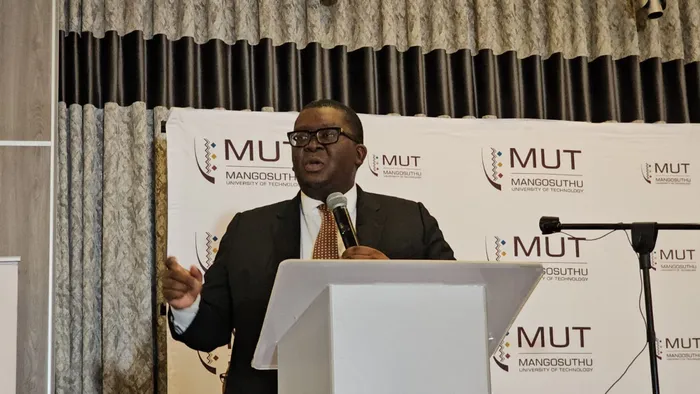Durban hosts international summit on climate change

Newly elected KwaZulu-Natal Cooperative Governance and Traditional Affairs MEC Rev Thulasizwe Buthelezi at the Energy-Water-Food-Climate Nexus International Summit 2024 being hosted in Durban. Picture: Karen Singh
The Energy-Water-Food-Climate Nexus International Summit 2024 began in Durban on Tuesday on the heels of the devastating storm that affected six districts in KwaZulu-Natal, with oThongathi the hardest hit.
Held in Africa for the first time, the summit is being led by Florida Agricultural and Mechanical University’s School of the Environment in collaboration with Mangosuthu University of Technology, with a focus on addressing the climate change challenges affecting access to safe water, procurement of sustainable energy and food security in Africa.
Speaking on behalf of new KZN premier Thami Ntuli, KZN Agriculture and Rural Development MEC Thembeni Madlopha-Mthethwa said the summit would highlight the need for resilient infrastructure.
She said not only is KZN in the process of rebuilding following last month’s storm, but the province is also implementing a build-better strategy anchored on resilient infrastructure and a smart approach.
The storm left a trail of destruction, with damage of R1.3 billion, she said.
“The havoc wreaked by the floods in 2019, 2021 and 2022 in our province is still vivid in the minds of our people,” said Madlopha-Mthethwa.
She said conservative estimates put the cost of the 2017 floods at R576 million; the 2019 floods at R1.8bn and the 2022 floods at more than R7.5bn for roads and housing alone.
Madlopha-Mthethwa said with climate change-related impacts on the rise, it is important to implement context-specific solutions based on different levels of interventions to achieve long-term economic, environmental and social goals.
The MEC said she is also optimistic the summit will produce practical and creative solutions that will address the water challenges in eThekwini Metro and the uMkhanyakude and Ugu District Municipalities.
“This gathering should bring practical plans to the energy challenges we have been experiencing.”
Madlopha-Mthethwa said while climate change cannot be reversed, the severity of its impact on human lives and infrastructure can be reduced through the implementation of programmes that reduce the emission of greenhouse gases and create resilience for communities.
The MEC added that when such events occur it is not only lives and physical infrastructure that get disrupted, but livelihoods.
“In Tongaat for example ... farmers, mainly broiler and egg farmers, lamented the fact that the tornado had undermined their ability to produce chickens and eggs. This means retailers run out of stock. This may mean that the price of eggs or chicken products rise,” said Madlopha-Mthethwa.
She said while showcasing the latest innovations to address the worst effects of the nexus of energy, water, food and climate challenges, at the same time the summit must seek to come up with solutions to the current challenges.
Also speaking at the summit was Bheki Nxumalo, who is Eskom’s head of generation.
Nxumalo said the issue of greenhouse gas emissions is key when looking at energy, water and food security and it will take many years to transform the country.
He said currently 89% of the country’s energy is produced by coal and 84% of greenhouse gases come from the energy sector, with Eskom at the forefront
He said Eskom is looking into how they can repurpose their plants.
“It's not just an option to say we are dealing with greenhouse gas emissions, let’s shut down demand, because we are creating even more poverty, more unemployment, and that’s not the solution,” he said.
Nxumalo said Eskom is looking forward to its research team partnering with MUT to assist with the transformation of the power utility’s energy mix from coal to clean energy.
The Mercury